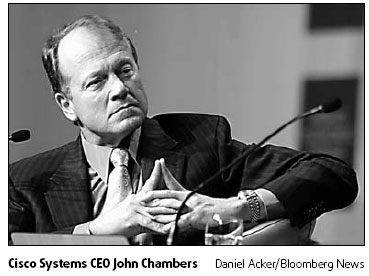Spending slowdown could stymie Cisco earnings

For Cisco Systems Inc, the trouble may just be starting.
Investors pummeled Cisco, the biggest maker of routers and switches used in communications networks, after profit and sales failed to top analysts' projections this month. While US banks and automakers dragged down results, the next shock may come from phone carriers, which account for a quarter of sales.
The world's top 25 telephone companies will reduce network spending by 2.1 percent in 2008, reversing this year's 4.3 percent rise, Cowen & Co analyst John Anthony estimates. That will force Cisco to miss the top end of its forecast for 13 percent to 16 percent sales growth in fiscal 2008, he said.
"I'm concerned they are not going to grow at 16 percent," said New York-based Anthony, who has a "neutral" rating on Cisco shares.
Revenue this year will rise 15 percent to $40.2 billion, Anthony said. That would fall $208 million short of the average of 26 estimates compiled by Bloomberg. Prior to the past quarter, Cisco's forecast had beaten analysts' projections in four of the previous five periods.
Phone carrier order growth decelerated to a "high-teens" rate in the first quarter from the "low 20s" in the fourth, Chief Executive Officer John Chambers said on November 7. Another dip would hurt Cisco shares further, said Shaw Wu, an analyst with American Technology Research in San Francisco.
Carrier reliance
Cisco, based in San Jose, California, gets as much as 30 percent of operating profit from carriers, said Wu, who says growth may slow and recommends buying the shares in the longer term anyway as Cisco benefits from companies sending more video, calls and data over the Web.
Telephone customers became more important to Cisco as Chambers expanded offerings for phone companies that were upgrading systems to stave off competition from cable providers.
In 2004, Cisco introduced the CRS-1 router, used by US mobile-phone carrier Sprint-Nextel Corp. and Australia's Telstra Corp to deliver video service. The CRS-1, Cisco's fastest and most expensive router, has reached about $1 billion in annual sales, with growth accelerating every quarter since it was unveiled. In May, Cisco added video streaming capabilities to its content-delivery system for wireline carriers.
While Cisco pursued phone carriers, sales to corporate customers such as automakers have fallen to less than half of revenue, down from two-thirds in 2001.
The expected slowdown in telecom sales will hit Cisco in the April and July quarters, Anthony said. He expects the shares to reach $32.75 in a year.
Meeting his prediction would produce a 13 percent gain for Cisco shares, trailing the 62 percent average annual increase since they started trading in 1990.
Merrill Lynch & Co's Tal Liani, who this month cut his forecast for the stock price to $33.50 in 12 months, said if Cisco only reaches the low end of its forecast, the shares could fall to $26.66.
Cisco, down 11 percent since the first-quarter results two weeks ago, fell 39 cents to $29.04 on Tuesday in NASDAQ Stock Market trading. Sales this quarter will climb 16 percent, Cisco said, to about $9.79 billion, the slowest growth in two years.
Cisco wins
A shift in the nature of purchases by telecommunications companies may explain some of the slowdown. Jeff Spagnola, vice-president of marketing at Cisco's service provider unit, said carriers will buy more equipment that uses Internet protocol, or IP, even as they cut overall budgets.
"We completely agree that on the macro level it's flat to down," he said of telecom spending. "It just happens to be that we're in a good spot. As the carriers move their spending to IP, Cisco wins."
Anthony points to companies such as Nippon Telegraph & Telephone Corp as evidence the slowdown is more extensive. Some carriers are using more efficient technology and can spend less to get the same bandwidth, he said. Others are delaying orders to iron out technology hitches.
NTT, Japan's largest traditional phone company, scaled back plans to add fiber-optic lines to its Internet network. The Tokyo-based company now projects 20 million fiber customers in 2011, down from a target of 30 million. Spokesman Hideki Ohmichi didn't immediately return an after-hours call for comment.
Acquisitions also limited spending, Anthony said. San Antonio-based AT&T Inc, the biggest US phone company, won't exceed last year's $18.6 billion budget, spokesman Fletcher Cook said. The figure includes its recently acquired BellSouth and Cingular Wireless units.
New York-based Verizon Communications Inc, the No 2 US phone company, is restraining spending as it nears the half-way point of its fiber rollout. This year's expenditures will increase as much as 4.7 percent to $17.9 billion, spokesman Bob Varettoni said. Last year, they rose 12 percent.
Neither AT&T nor Verizon gave a forecast for 2008.
"Service provider has been a bastion of growth," Wu said. "It's bound to slow down."
Bloomberg News
(China Daily 11/22/2007 page16)














